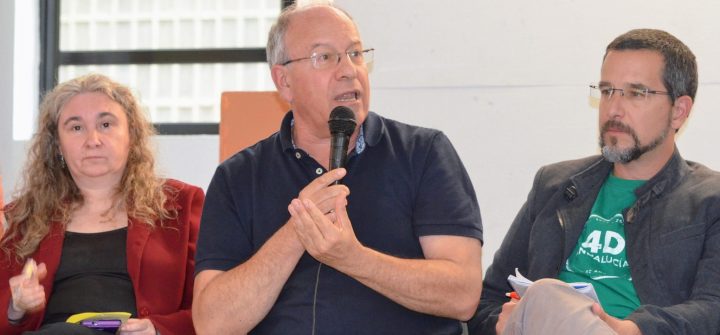Interview with Tomás Hirsch, Humanist Party congressman from Chile, during the European Humanist Forum in Madrid.
Hirsch talks about convergence and political alliances, the crisis of the Left in Europe, the role of parliamentarians and relationships with social movements.
(The video comes with subtitles in Youtube and the complete translated transcription can be found below.)
We are here with Tomás Hirsch, a humanist congressman from Chile. We have a question. With regard to what we see happening in Europe, we’re seeing that a great deal of strength is being lost, that social democracy is disappearing as a political force and at the same time others are appearing because a vacuum is being created. So I wanted to comment on that situation. What do you think?
Social democracy is disappearing in Europe and is disappearing in Latin America and for a very simple reason. Between a bad copy and the original, people prefer the original and as social democracy has ended up preparing the ground, paving the way as we say in Chile, for the right, maintaining the neoliberal model and even deepening it, with some “humanizing” touches. Well, in short, people have said, “what’s the point?” And some have ended up voting for the right and others have left social democracy because they are looking for an alternative of profound structural change.
Today we cannot pretend to “improve” the model, to humanize the model, to retouch the model. Either you are with this individualistic neoliberal model, or you are for a structural and profound change in society that guarantees people’s rights.
Social democracy did neither. Well, at least we humanists and other organizations are about to make what we call a revolution in the good sense of the word; to change social structures so that citizens have rights and can live with dignity.
For a political force that at one point understands that alone it cannot bring about major social change, it cannot, and it must somehow work with others, on what principles should it get involved in working with others?
If you work with others it is because you accept that they are different from you so you have to find points of convergence.
We in Chile work with organizations that come from very different worlds: Marxists, feminists, ecologists, liberals and, of course, humanists.
We agree that we must build a fairer country, a more democratic country, a country with more rights for all, a less violent country, a country that decentralizes power, a country that generates a democratic constitution.
These have been points where we all converge and we maintain diversity in many other aspects of society.
How can the politician’s activity be better linked to their social base in terms of political responsibility?
I believe that it is indeed very easy as a politician to disassociate oneself from the social base of the territory. What I have seen in these two months is that parliament is like a microclimate, it is like a capsule that disconnects, it isolates you, and you can stay there entertained for life.
That’s why I think it’s so important to remain grounded and to understand that our fundamental task is to strengthen the organization in the territory, the link and the work with social movements. It is not replacing the social movements, it is putting oneself at the service of the social movements, which is another look, another conception.
How can I be useful to these social movements in the parliamentary work? How can I promote legislation that comes from social movements? How can I help them strengthen their organization? How can I work with them to open doors to the powers of the state?
That is the task. I believe that frankly there is no point in parliamentary work other than to work on the ground with these movements.
First of all you are a humanist and recently you have become a humanist congressman and now from this perspective, do you think that a change is really possible as a congressman? Is it possible to bring about significant social change?
I do not believe that it is possible to bring about change as a congressman. I believe that it is possible to contribute as a congressman to a larger project. The project is one of social transformation, so it is important to have people where the laws are built. That’s where you can agree with others. Where pressure can be exerted on governments. Where you can influence the municipalities.
So, yes, I think it makes a lot of sense to work as a congressman. Today we have just finished two months today and it has been very intense and we have presented a bill, for example, so that the citizens can put urgency into the laws that have been sleeping for years in parliament. We have tackled the government on a number of issues, demanding that the citizens of the community be informed about different situations that affect them.
We have provided feedback on more than 10 legislative projects that affect healthcare, education, housing, work, welfare. So, yes, I think you can do things. Some of the issues are already becoming law even though we know it will take more time.
But the most important thing I insist on is how to build with social movements, how to contribute to organizing in a society that strengthens and proclaims individualism, fragmentation, and caring only for oneself.
So it is a mixed task in the parliament and in the community territories.
Many thanks










